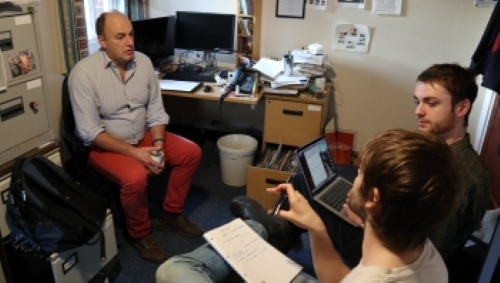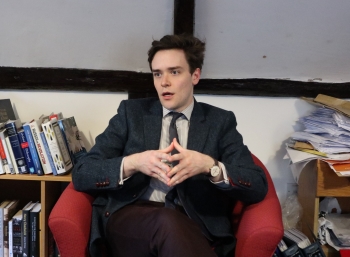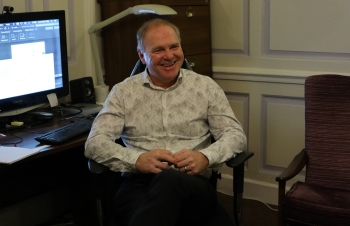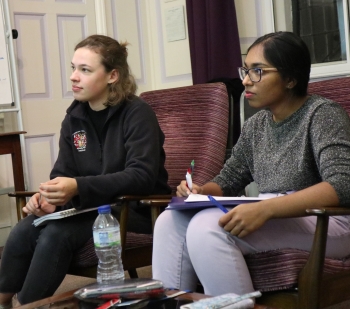
“Any questions? Any thoughts?” often brings deadly silence into classrooms in South Korea. It happens in 2020 as it did a decade ago at the 2010 G-20 Seoul summit when Barack Obama specifically offered the Korean press a chance to ask the first question as host country. Half a minute of silence initially filled the room. Eventually, a Chinese reporter opened the conference with his questions, a rare moment when journalists themselves became the news. It reminded Korean society of the bitter reality of the nation’s intense education system that has failed journalists, who are often hailed as some of the best intellectuals of the society yet were unable to ask a single question in a global press conference.
What does this silence mean to the world? Generally, unwillingness to speak has had a negative connotation in the west. The evidence can be found from the word ‘dumb,’ which means ‘stupid’ in modern days but comes from the literal meaning of being muted or silent in Old English. In contrast, learning to be vocal has never been the highest priority in Korea’s intense education system. For instance, Suneung, the Korean university entrance exam and the ultimate gateway to admission letters for many high school seniors, has no writing or speaking sections.
Ewha Voice took a two-week trip to University of Oxford and University of Cambridge in England, where the world’s first student debating societies initially emerged in the early 19th century with these following questions in mind: What influences people to share and challenge each other’s ideas? How do buildings shape people and its society? Can appreciating silence be labeled as a culture anymore? Most importantly, why is it important for youth to be vocal with their opinions?
The first edition of this overseas coverage will explore the history and benefits of a one master, one pupil system that started in ancient Europe. For undergraduate studies, this system is called “tutorials” at the University of Oxford and “supervisions” at the University of Cambridge. According to the school, it's an expensive system in which the university loses a huge amount of money with each undergraduate. However, the school regains the money from postgraduates thanks to its high level of research teams which attracts funding from world governments.
The tutorial system received attention in Korea with Homo Academicus (2013), a documentary broadcasted by Korean Broadcasting System (KBS), in which four Harvard students travel to historically significant places of learning, focusing on the role of cultural differences, financial inequalities, and the style of education. A few universities outside of the United Kingdom such as Williams College in Massachusetts and Sarah Lawrence College in New York have similarly adopted this system.
Multisensory Tutorials at Oxford
Dr. Charles Spence, a professor of Experimental Psychology and a fellow of Somerville College at the University of Oxford, claims everything in his office plays a part in his experiments. His main interest in research lies in how our brains manage to process information from different senses – smell, taste, sight, hearing, and touch – making tutorials the perfect way to teach for him.
For example, during his tutorials, he can easily bring up a perfume called “Sweet” made by Roja Dove, one of the world’s most famous perfumers. Students can take the time to smell this and test how they perceive the scent differently depending on the type of music they hear while doing so. This would not have been possible in a lecture hall filled with 100 students.
“By showing my stuff, I would like to show students that what they learn can be applied to real life. My lectures are not very multi-sensory, but my tutorials are,” Dr. Spence added.
Tutorials are also a golden opportunity for students as they can get to know the world-class lecturers better in a personal level.
Lewis Bizaoui, the student on the right in the picture above, is in his third year majoring in Experimental Psychology. He stated that he can directly ask questions from the reading materials because most of them are either those Dr. Spence has written himself or reviews he has made of other scholar’s works.
However, learning how to talk with one of the most renowned academics in the field does not happen overnight.
Bizaoui had a reading list of six key articles, a book, and 20 more additional articles to prepare for this tutorial. Writing the essay for this class took another ten hours.
“I know a few cases where students would sit down and not say anything in their first tutorials because they were nervous or not prepared for them," Bizaoui said. "It is important to be comfortable with speaking and to come to the class prepared. Tutorials force you to do so in a welcoming and encouraging manner."
When asked about his experience with the tutorial system as a tutor, Dr. Spence recalled a few post-doctorates from Japan he had who would come sit in his lab and remain completely silent.
According to Dr. Spence, knowledge eventually fades away, so the content of what students learn is not the first priority for him.
To learn how to write an essay, marshal your thoughts, counter your debater, attack their evidence, structure it, and eventually put it together in a report, constitutes the core of his tutorials. These are what truly matter to the tutor and the student at the end of the day.
In fact, he wants students to have the confidence to say, “No, I don’t believe what you’re saying,” or “You are talking rubbish,” to his views because “that’s the only way anyone can learn something new.”
Cultivating an atmosphere of intellectual equality

The origin of the tutorial system can be traced back to the early modern period, which is between the 16th and the 18th centuries, when Oxford’s teaching method was based on a principle of what was described as “lecturing” back then.
“Lecturing then would not mean the lecturing we know today, where a professor stands in the front and students sit in the audience listening,” said Dr. Joshua Bennett, a Junior Research Fellow in the Department of History at the University of Oxford.
“Rather, lecturing worked on the basis of a text as the professor would discuss its meaning with the students forming a small group. It was in the 19th century that a developed model of it called a ‘tutorial’ emerged, which was the system of a weekly meeting with one or two students and an individual tutor.”
According to Dr. Bennett, the tutorial system has continually placed emphasis on the personal development of students and the relationship with the tutor.
The role of a tutor is to foster students’ own ability to research a topic, break it down, and devise an interesting and convincing answer. Then students would write an essay on their acquired answer and develop an argument for themselves.
Dr. Bennett’s rich experience with the tutorial system comes from his background in learning within the tutorial system as an undergraduate student at Oxford as well as being a tutor to students majoring in history at Christ Church.
“When I was an undergraduate, I gained the ability to process a large amount of information and a lot of intellectual perspectives from scholarship in a concentrated period,” Dr. Bennett said.
“In an extensive area of controversy, I was also able to focus on the important issues and discuss the interpretations I had related to the topic. On the other hand, currently as a tutor, I take the responsibility to conduct such effective tutorials to my students.”
Tutorials not only bring multiple benefits to students but also to scholars and tutors themselves. For this reason, Dr. Bennett’s tutorials focus on trying to cultivate an atmosphere of intellectual equality between himself and his students.
One day, for a tutorial about William Morris, the 19th century artistic writer in Britain, a student came into the classroom wearing a piece of Morris’ decoration to express his keenness for the writer's work. Dr. Bennett instantly noticed this and was able to appreciate how much the student valued and was engaged with the tutorial process.
“Students can always bring valuable insights,” Dr. Bennett said. “I may have read more than they have. However, at the same time, I find it valuable to hear what younger people who join the subject for the first time have to say because they bring fresh thinking and new perspectives. That is why tutorials not being hierarchical is very important to its success to both tutors and students.”

Director of Studies: a key academic relationship students form within Cambridge

Supervisions that characterize the Cambridge undergraduate education experience are monitored by the Director of Studies, who arranges the supervision for students in their college and supports their academic progress. Ewha Voice had the chance to meet with Dr. Laurence Tiley, Director of Studies in Medical Veterinary Sciences at Queens’ College, and join a supervision of his.
Dr. Tiley explained that in Queens’ College, fellows and teaching associates who are affiliated with the college teach as supervisors. As for some other colleges, they ask PhD students and post doctorates to contribute as well.
Dr. Tiley started his supervision by checking in with his two second-year students majoring in Veterinary Medicine, Lucy Kirkwood and Renuka Chintapalli, on any questions they had come across during their lectures. Instantly, Chintapalli asked how to differentiate certain toxins.
“As a supervisor, instead of giving information, it is more fun for everyone if there is more give and take,” Dr. Tiley said. “That is why I appreciate lots of questions at the beginning of supervisions. I would much rather spend time communicating with students.”
Kirkwood continuously asked questions starting with interrogative pronouns like why, what, and how. When Kirkwood asked, “What do you mean by type eight?” Dr. Tiley tried to answer by relating a situation to a previous laboratory work the students had.
“I like to clarify things,” Kirkwood said. “I am able to do so during supervision. In fact, supervisions played a major role in making me want to come to Cambridge. As for the majority of other universities that lack the system, students would be overwhelmed by information and become anonymous during class.”
Dr. Tiley added on by saying that the trimesters at Cambridge are each about three months long, which makes it short, and therefore very intense. Lecturing supplemented by supervisions helps the students acquire information in a short period of time. As the supervision system is tailored particularly to individuals, it can identify student’s strengths as well as weaknesses and help them improve by providing additional information.
Another role of the Director of Studies is to make sure the school is not overloading the students. If students feel like they are being overworked, they can approach their supervisors and say, “This is too much” or “Can I have a bit more time because I am feeling pressured” without worrying about receiving a bad mark.
“We know our supervisors really well, which allows us to approach them confidently,” Kirkwood said. “One of the things that our supervisors keep asking is “Is this really helpful?” If it is not, the supervisor tries to revise a different way that works for us.”

The students emphasized how this overall process is much more efficient than independent learning.
“Talking despite being right or wrong is for my own benefit,” Chintapalli said. “I think there is an attitude especially within science students where it is quite competitive. Nonetheless, instead of looking at everything by themselves, students discuss matters in supervision, receive help, and equally help others. In the case of education, discussion is a form of consolidating information.”
For the next edition, we will cover formal debates in Oxford and Cambridge Union, one of the oldest student debating societies in the world.

